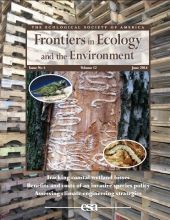Biological invasions are a major threat to ecosystems, biodiversity, and human well-being, resulting in ecosystem degradation and causing economic costs in the multi-trillions of euros globally. A study led by McGill University sheds light on the stark economic cost resulting from biological invasions in the European Union (EU).


Ballast water release from ocean vessels has introduced hundreds of invasive species to coastal ecosystems worldwide, causing major disruptions to fisheries and biodiversity. Attempts to control aquatic invasions have met with mixed success in general. However, a new study suggests that a bi-national regulation targeting ships entering the Great Lakes since the mid-2000s has been remarkably effective in reducing a large proportion of the invasive species in the world’s largest freshwater ecosystem.

The search of life beyond our world is an exciting venture that may yield an enormous discovery in the not-too-distant future. However, space agencies around the world, including NASA and the European Space Agency, have long been aware of the potential risks of biological contamination and have set in place planetary protection policies.

Rising global maritime traffic could lead to sharp increases in invasive species around the world over the next 30 years, according to a new study by McGill University researchers.
The findings, published in the journal Nature Sustainability, suggest that shipping growth will far outweigh climate change in the spread of non-indigenous pests to new environments in coming decades.

Shipping and mining in the Arctic. The spread of invasive microbial pathogens around the world. Changing agricultural practices. Use of genomic-modification tools. Those are among the 14 most significant issues that could affect the science and management of invasive species over the next two decades, according to an international team of ecologists, who published their findings in the journal Trends in Ecology and Evolution.

A mussel never reported in Canada was identified in the port of Montreal, a soft shell clam never seen in the Arctic was discovered in the Hudson Bay in Churchill, Manitoba, and a barnacle that was not thought to occur north of San Francisco was detected in Nanaimo, British Columbia. These are invasive species and researchers from McGill University detected 24 of these non-indigenous species across 16 major ports in Canada, including 11 that were identified in previously unreported locations. Their findings were published Biodiversity Research.

The McGill Reporter | Feb. 3, 2015
By: Melody Enguix
New study from scientists at McGill shows the vulnerability of the basin to future invaders – and calls for regulations to mitigate this threat.
Read the full story here.

The Great Lakes have been invaded by more non-native species than any other freshwater ecosystem in the world. In spite of increasing efforts to stem the tide of invasion threats, the lakes remain vulnerable, according to scientists from McGill University and colleagues in Canada and the United States.

Risk analysis finds savings for homeowners and local governments of excluding invasive pests like the emerald ash borer outweigh added cost to imported goods
